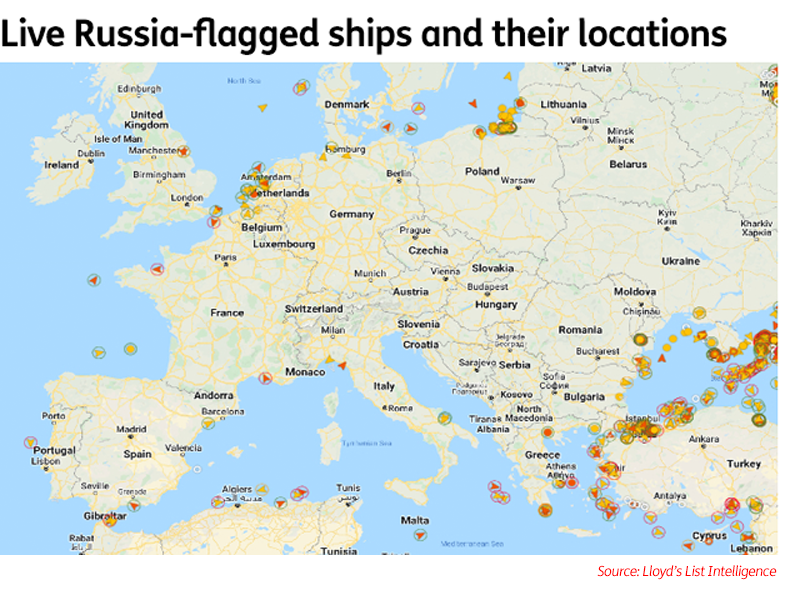Russia-flagged tanker remains in Greece pending court case
Aframax seizure in Greece earlier this month related to European Union sanctions was later revoked but the ship is still at Karistos awaiting a court ruling, Lloyd's List has learned
The 2003-built Lana was detained on April 15 based on its former ownership. The seizure notice was later withdrawn as the new registered owner was not on any EU sanctions list.
A RUSSIA-flagged tanker seized this month in Greek waters remains at Karistos port pending an undisclosed court ruling, Lloyd’s List has learned.
The 2003-built aframax Lana (IMO: 9256860) was detained on April 15 based on the vessel’s former ownership, not its cargo. The seizure notice was later withdrawn as the new registered owner was not on any European Union sanctions list.
The vessel, which was reportedly laden with Iranian crude oil, was formerly known as Pegas, and was owned by Russia’s Promsvyazbank and registered to the bank’s financial subsidiary, PSB Leasing, according to Lloyd’s List Intelligence data.
Registered ownership and ISM management changed to TransMorFlot in March, while beneficial owner has changed to Jamaldin Pashaev, a Russian national.
The US designated Promsvyazbank and its 42 subsidiaries on February 22 in a move designed to thwart Russian action in Ukraine. On March 2, the European Council said it would prohibit Swift financial messaging services to the bank and six others, along with capital market restrictions following Russia’s invasion of Ukraine on February 24.
There were no legal grounds to impound the ship following checks and the coast guard had been ordered by the anti-money laundering authority to release the vessel, Reuters reported, citing official Greek sources. No further details were provided and no date was given for its departure.
According to Lloyd’s List Intelligence data, the vessel had been expected at the Marmara terminal in Turkey in January, and the vessel ended up in Greek waters unintentionally.
Following engine failure, the vessel was being towed when inclement weather forced it to anchor at the port of Karistos. Several other deficiencies were found upon inspection.
The Lana case coincides with the EU banning Russia-flagged ships at its ports as part of a fifth tranche of sanctions against Russia’s incursion into Ukraine. The ban also includes those that have reflagged after February 24, the day when Russia invaded.
However, there are exemptions for vessels carrying oil and other energy products, agri-products, medicine, and for humanitarian purposes.
Since the ban took effect on April 17, there have been more than a dozen derogations granted by EU member states, Lloyd’s List understands.
According to Lloyd’s List Intelligence data, there have been 30 port calls by 22 Russia-flagged ships, mostly general cargo with container capacity, since the ban took effect.
At least seven vessels are currently at EU ports, in the Netherlands, Spain, Sweden, Belgium, Bulgaria and Italy, data shows. Just one ship over 10,000 dwt has called in the past four days, undertaking a ship-to-ship transfer around Malta.
Several other ships are undertaking STS transfers, but these are taking place in international waters around EU ports.
The European Sea Ports Organisation had called for clarity and uniformity around the ban on Russian vessels.
While some ports were working off their own lists of sanctioned vessels, other ports were relying on ministries or central government for direction.
The European Commission said it was the responsibility of member states to enforce the ban, with monitoring done via the Union Maritime Information and Exchange System.
It added that for most countries in the 27-nation bloc, it is for the ministry of foreign affairs to give direction to the maritime/port authority/administration and/or customs authorities.
While identifying Russia-flagged vessels is easy, it is the reflagging that might be more difficult to ascertain, and ports are carrying out due diligence to avoid being caught out.
A dynamic list has reportedly been drawn up, in collaboration with the European Maritime Safety Agency, which has been sent to relevant authorities to make it easier for port officials to identify sanctioned vessels. The list is constantly being updated.


